JESSICA MAX STEIN: What was Richard like as a kid? It sounds like he was a born performer.
JANE HUNT: When he was about four, he’d managed to fall and knock out one or both of his front teeth, so he had a hard time talking for a while. His godmother brought him this little outfit: little corduroy pants, a little corduroy jacket, sort of like an Eisenhower jacket, and a newsboy cap, like a man on the golf range. And he came out, and he stood there leaning on his umbrella, and he said, “I’m wearing my gelfing outfit.” Out of nowhere. That was adorable.
He and his brother and sisters put on performances on the landing, and they loved doing that.
JH: When he was growing up he did all kinds of things as a Boy Scout. He did take his puppets to the Boy Scouts. For many years, every year we’d have a Memorial Day picnic out in the backyard here, with people from all over [at which Richard performed].
When Richard was about 5 or 6, we were at Howdy Doody. Kate had been chosen from the crowd of children to sit up in the peanut gallery. Richard was sitting in that audience as well, and all us parents were taken back into a little viewing studio, to watch this live show go on. It was live then, nobody had taped shows. The host, Bob Smith, was getting up and guiding them to the end of the show. Richard came down to center, tugged on Bob Smith’s coat and said, “I’m a magician, and I want to do a ’rick.” He had no teeth in the front, from his fall. “I want to do a magic ‘rick.’” And Bob Smith said, “Well, I don’t think we have time.” But Richard took it right out of his pocket, and he started doing the trick. I was sitting there with all these parents, like, ‘Oh my God. Oh my God.’ He’s doing this trick, something with balls, and he says – he didn’t say voila, what else do they say? Something very cute. And he completed the trick just as it went to black.
ARTHUR MILLER: He had no fear. That is very true about him.
JH: Yup, no self-consciousness about asking if he can do something or another, which I think is so great.
JMS: What were things like for Richard as a teenager? You told a story about the kids teasing Richard when he was in middle school, following him on his paper route and dropping his papers in the mud.
JH: Yeah. They tortured him. He’d never told me. I never knew anything about it until the principal told me. His office was in a corner room in the school building right across the street, which was part of Richard’s paper route, and he saw it, day after day after day. I never heard a word from Richard about it. He just shrugged it off. “They’re jerks.” He certainly didn’t let it stop him from anything.
JMS: Richard not only was a born performer, he was a born upstager.
AM: Richard had a secondary lead in a high school production of How to Succeed in Business [Without Really Trying]. The main character sings a song in the men’s room, with the chorus.
JH [singing]: “I believe in you, I believe in you.” They’re all in front of the mirrors and they’re doing their hair, straightening their ties and stuff. All of a sudden we see Richard has pulled out of his pocket a razor, and a spray can of shaving cream. He’s singing right along. He shaved himself. He then put cologne all over himself, and the place was falling apart. The other kids were washing their hands, not knowing what the hell was going on.
AM: One gets the feeling this was not something the director had encouraged him to do.
JMS: He did that a lot.
AM: Yes, he did that a lot, and he got away with it. Most guys cannot get away with that stuff, because it’s a real no-no, it’s arrogant. Upstaging, you know?
JMS: They loved it at the Muppets. There’s some footage from the Fraggle Rock wrap party, where Karen Prell is giving a comic speech about what it’s like to be a Muppeteer, and she says, “The first rule of Muppeteering: If it moves, upstage it!” [group laughter]AM: But the fact that he got away with it – almost always.
JMS: Because it’s funny!
AM: That’s a big part of it, but there’s something beyond that, I think.
JH: It’s as though everybody felt he was entitled to do whatever he wanted to do.
AM: Exactly. You give it to him. You say, “What the hell, it’s so wild to watch.”
JH: He would have spent hours with anybody in the cast, anywhere, helping them get through and do their parts and making suggestions to them. They’re not supposed to do that, but in high school I know he did.
JMS: He did it later; Kevin Clash talks about that, David Rudman talks about that.
AM: All of that stuff was in place way before he even heard of the Muppets.
JH: Yes, definitely.
AM: I can tell from these stories that – like you say, he was funny, and it was done in a generous spirit. Even though it was upstaging, there was a generosity to it.
JH: I think he would have loved it if they’d all started to shave, or something.
AM: You told me he took out Q-Tips.
JH: Oh yes. Cleaning his ears. [group laughter] Oh God, isn’t that too much.
JMS: Tell me about Richard cold-calling the Muppets.
JH: Yeah, from a pay phone. Right there on 10th and 57th. “Hello, I’m a puppeteer, can you use me?” “Well, we happen to be having a little thing going on right now. Why don’t you come on over and audition?”
JMS: That takes guts.
JH: It takes a kind of unselfconscious feeling about how you’re worth doing that. That you’re worth it. And he did get that in this house, with all these kids running about, and all their little friends. There were times I’d cook dinner for not just seven of us, but eight or nine or ten of us, and it would be almost every other night. ‘Mother, can so-and-so stay over?’ ‘Yes dear, have her call.’ This is what he learned, he learned that we just keep giving out. And this is where everybody wanted to be, in this silly little house.
They all loved being in this house. Their father – Father Richard, as opposed to Young Richard – would be too drunk to talk. My father was like that too. The kids would come to my house, just like they came here. I think that’s why I was so able to do it, because that’s the kind of house I grew up in. So everybody gathered around us, and it was terrific because my kids didn’t have to be out in cars, in that state of hilarity.
JMS: So his father’s name was also Richard?
AM: There was Father Richard and Young Richard. And then later, as he grew up and started to run everything, he called himself EKR, Evil King Richard. That was his nickname with his family for quite some time. They also called him Young Father. Even probably before father died, they called him Young Father. And they didn’t call him Young Father for nothing. Even before they struck it rich, he in a lot of ways did take on the father role. Richard was the guy who kept the Hunt family together in a certain way.
JH: Yes, definitely.
AM: For example: Jane’s mother, Grandma, still lived out there in West Virginia. He would literally insist, I would say force everybody to call Grandma. Every year, when there would be a Christmas party or something like that, he would take that phone and call Grandma. He’d take this phone to every family member, and shove it in their face. Looking back on it now, I realize that his sense of family, and holding onto that family… They stuck together. I think that meant something to him. He was kind of removed.
JH: Yes, he was. He liked to watch. And this is what he did when he was this high, able to stand up and go into the elevator at Lincoln Towers [in the Bronx]. He’d back up into a corner, and he was just standing there – we got on at the 10th floor – all the way down, people getting on and everything, and he was just observing, observing, observing, not saying a word, just watching and listening. I always thought that was the basis of his talent. I really did.
JMS: I often think that Richard seems like he’s on the inside, and he’s on the outside, at the same time.AM: Well put.
JH: Yeah! Very, very well put.
JMS: He’s like Scooter on The Muppet Show. They couldn’t do it without him. He meets the guest star, he’s everywhere, but he’s still always this little tagalong. Scooter in The Muppet Movie, he’s the road manager because he’s the one with the van. You get the feeling that he’s a little younger, a little “Hey, wait for me.” But at the same time, he’s in. He’s part of it, he’s it! Although I don’t know how much I’m extrapolating from the plot of the show to what happened behind the scenes.
AM: Scooter was to some degree based on Richard. I think they did that with a lot of the characters, just from what I see and what I’ve heard and what Jerry [Nelson]’s talked about, that they would take the essence of the puppeteer. I think they did it unconsciously, so that there was a lot of Richard in Scooter.
JMS: Richard seemed to have a wonderful camaraderie with Jerry Nelson.
AM: Jerry was almost like a father figure. Certainly like a big brother that Richard never had. Jerry was as gifted as Richard, as soulful as Richard. I remember I once said to him, “You guys were like the Abbott and Costello for this age.”
JMS: So many of their characters. The Two-Headed Monster. Biff and Sully.
AM: They ad-libbed their asses off on that show.
JH: They really intuited all that stuff.
JMS: Another great one is Placido Flamingo.
JH: “Oh, Ree-chard!” One day I was walking home, past the Met, and going into the Met was Placido Domingo. I thought, “Richard would do this,” and I just walked right up, and I said, “Mr. Domingo, I’m sorry to bother you, but I wanted you to know that I’m Richard Hunt’s mother.” And he said, “Oh, Ree-chard! Hello! I am so sorry.”
JMS: I hear that Richard loved to throw parties. There’s one story where you were singing “Rose’s Turn.” That’s not the most maternal show tune ever made.
JH: That was Stuart Fischer [Richard’s friend] who did that. It was at one of the parties at his house I was handed a glass of champagne, put it to my lips, and there in the bottom was a pair of pearl earrings.
JMS: Good thing you’re not the kind of person to drink it all in one go.
AM: Yeah, chug-a-lug! [Arthur makes choking noises, group laughter.]
JH: I want to look good while I’m doing it. So I said, “What’s this?” Of course everybody was in on it. When is mother going to find her earrings?
AM: Richard designed a true, big-time surprise party for his mother’s 60th birthday. Somehow he managed to put together just about everybody who had ever known Jane, since she was in elementary school. She was told that she had to perform a few tunes, just the way Richard would sometimes get her to do, that it was somebody else’s party.
JH: He had me sing at all his parties that he gave.
AM: It was [supposedly] a party for Jon Stone. She was supposed to show up at one of these fancy places on a barge under the Brooklyn Bridge. I was instructed to see to it that she didn’t get there until everybody else had arrived. I was the navigator, I had the instructions of how to get there, and I deliberately f***ed them up, so that we would be an hour late.
JH [laughing]: I was so mad at him! I said, “You’ve lived in New York your whole life and you don’t know where the Brooklyn Bridge is! Now what are you doing to me?”
AM: “Turn here, turn here! Oh no, don’t turn here!” The whole thing about a surprise party, as far as I can see, is the irony of everybody doing a number on the person, and the person not knowing it. It’s a combination of love and hostility. Very New York.
Anyway, we finally got there, she was so flabbergasted, so worried about the material she was going to do. We walked in, big place, at least 100 people, maybe more. The performance had already started. There were people on the stage, there was a piano player, there were all these people in folding chairs. Stuart was singing “Don’t Tell Mama” and dancing around.
JH: In the meantime Kate [Richard’s sister] was distracting me. “Take your glasses off, you don’t want to go out there with your glasses on.” So they took my glasses off.
AM: So she gets on stage and she’s sitting in the chair with four or five other people who were about to perform. She never even gets to perform. Somehow her eyes get acclimated to the light, and she’s checking the audience out. And you watch her – everybody watches her – slowly get it. It’s not like a surprise party where you open the door, the lights come on, “Surprise!” and there’s one moment where everybody flashes the picture, and then it’s over. If she had had to perform it, there never would have been that honest moment. You see her looking out, and everyone’s watching Jane, and she has no idea! She always wishes that everybody watched her, but they literally were watching her.
JH: I looked out in the audience, there were two friends of mine from high school.
AM: He had them stand up, one by one. He had worked this whole thing out. He had staged the whole thing, and given them all, obviously, instructions. And they stand up, in the audience: one, then another, and you watch her go, “Boinnng! Boinnng!” She notices them!
JH: And Rachel, and her friend, another Jane, and one other person – must have been Lyn [Richard’s sister]– sitting in the three chairs stage left, all of them with dark wigs on their heads, not looking like themselves at all until I got up on stage.
AM: You can see her starting to go… Stuart’s still singing. And then other people start standing up, and you see the exact moment when she gets it. And what does she do? She starts to dance. She does the steps, the high steps.
JH: I got up and danced and I said, “This party is for me!”
JMS: One thing I like about what I’ve learned about Richard is his sense of abundance. It’s really easy to think that things are scarce, that love is scarce, money is scarce, and the stories that I see about Richard is he really — he lived with abundance.
JH: That’s a very good word.
AM: Everyone tells these stories about Richard’s, what I call pathological generosity, almost crazy generosity. Once he hit it big, he wasn’t married, he didn’t have any children, he was never big with clothes and stuff, he just bestowed it.
He would take the family on these big junkets, these Hunt junkets. He took us all to Hawaii. The Hunt family was not just the brothers and sisters. There was a second ring of people who are as good as brothers and sisters. So he took between 15 and 20 of us to Maui, for a week, at one of the fancy-schmanciest, goyishe places. All white belt, white shoes, and into this milleu comes the Hunts, who change into their bathing suits in the parking lot, you know.
JH: At a certain point, he took the entire family to Italy. He was still in England, Adam was put in charge of us, and he arranged that we go to the Forum at a certain time on a certain day. And so we’re wandering around in the Forum and I’m taking pictures, and there in the entrance to the forum is Richard watching his family with that lovely look on his face.
AM: I would watch Richard working the planes when we would travel. He’d find any kids on the plane and he would approach them. Of course, at first the parents would have no idea who he was, he wouldn’t be working a Muppet or anything. And I would watch. You know the way people first are, “Who is this?” And then they do that turn, that shift, without even realizing it, they’re drawn right in. And then they’re watching their child dig Richard.
One of the things I always heard him say that would knock people out, to a little kid, is he would look at him and say, “You’re sick.” The kid would laugh at some joke or say something that a kid would say, some disgusting little thing, and Richard would look at him and say, “You’re sick.” And the kid would just love it.
I think he must have given something to more people than you could possibly imagine. Especially kids, who are so used to being condescended to or dismissed or pushed around or “Say thank you to the nice man,” all that stuff, and he would have none of that.
JMS: When did Richard come out to the family?
JH: Well, the first thing I knew anything about it was after that thing that you described [in the zine] of the time when they [Kate and Richard] went waterplaning and crashed on the parkway, when Richard told Kate [that he was HIV-positive, around 1987]. She didn’t come running around telling everybody.
AM: He never really came out.JH: No, he didn’t really come out.
AM: It was obvious, it was made clear, but he didn’t announce it.
JH: He kept things very separated, and in their places, where they belonged. Once he brought a group of guys to my house one night, I knew all these guys were gay. Did I know that Richard was at the time? I’m not really sure.
AM: I have a feeling there was a period in your family when everybody sort of knew. He would start to show up with guys, right?
JH: Yup.
AM: And nobody really said anything, you used to say to me.
JH: No, no. We welcomed them all the same, whoever it was, come on in. There was one boy who used to come over – he must have gotten out early from school, or he cut class or something, and he would come over here, and he’d sit on the floor with his back against the couch, and just wait for Richard to come home. And sometimes Richard wouldn’t come home, and so he would get up and say, “Well, I’m gonna go now.” That was all that was ever said.
JMS: You tell a story of a lover who predeceased him, who died in his arms. Do you remember who he was?
AM: The guy that Richard was with at the end, I forget his name, and I’m embarrassed. They lived together. And when he died – this was a guy who sat in a room, he was gorgeous, but he barely spoke. Richard threw a memorial for this guy, it predated the Henson memorial, in St. John the Divine.
JH: In one of those off to the side chapels.
AM: He threw this memorial with a gospel choir, and a string quartet. This guy was very quiet. Most of them were very quiet, sat quietly. Richard ran the show. Richard drew everybody around, and most of the guys he was with, from the time I knew him, were quiet, not overt. The last one hardly spoke at all. I never really saw him with a guy who was – like Richard, for example. Expansive.
JH: Richard was so unabashed, everybody knew, that I think lots of his partners weren’t used to the kind of openness they found in our family and in our family’s crowd. Certainly the guys in the Muppets, the guys at Sesame Street, were not in any way concerned about any of this.
JMS: I love the story that you tell about Frank Oz being at his bedside in his last weeks. People ask me if he was out at the Muppets, if they were okay with it, and I just say, “Frank Oz was at his bedside when he was dying, and if that doesn’t tell you that they were okay with it, nothing will.”
JMS: I was curious about what Richard was like spiritually. I know he grew up going to the Episcopal Church.JH: Yeah.
JMS: And then I know that Richard and David Rudman went to Macchu Picchu, and Rudman says that was like a spiritual pilgrimage. I know it’s a fine line. Maybe his art and his work and his life, living in the moment and all that, that is a kind of spirituality, but I was curious if he was ever more explicit about it.
JH: No, not in the sense of going to church every Sunday or anything of that nature. But I think he was spiritual. We’re the kinds of people who would be driving along in the car and say, “Look at that!” That kind of thing, that’s what we were all about. Everything new. When we were on Maui it was simply gorgeous. We appreciated every single bit of it. The whole family is like that.
AM: You know, I was just thinking, we were talking about Richard coming out. I think that was his spirituality. I think he kept that sort of to himself. Although I have to tell you, he was the butchest gay guy around. You wouldn’t really think of him as – He didn’t generate too much of that homosexual vibe, either in his behavior or the way he carried on, or anything like that. He was an equal opportunity comedian. He saw the humor in everything. But I think his spirituality, whatever that means, to anybody, that was kind of something that he kept to himself.
JH: Very private.
AM: You’d have to extrapolate it.
JH: I think many of these little deeds I love to talk about [exemplify his spirituality]. He was on Central Park West, and there were two old ladies with suitcases out on the curb, waiting, trying to get a cab and the cabs wouldn’t stop. So he had to walk over and say to them, “What is happening here?” “We need to get to the airport and the cabs won’t stop.” So up went Richard’s hand, he stopped a cab, said “Get in,” opened the door for them, got them in, “Tell them where you’re going,” and in the meantime he put the bags in the trunk of the car, gave the guy probably forty dollars or something, and sent them on their way. Now to me that’s spiritual.
The woman who was crying her eyes out because she wanted to kill herself, down there by the pond in Demarest. He noticed this woman crying, in the car, when he drove by. He stopped his car, got out, went back and said, “What’s the matter?” “I want to die, I want to die.” He said, “Just a moment,” and with that he hailed another car, said, “Please call the police right now, we need this woman to be taken care of,” and he stayed there with her and talked with her until the police came and took her off to the hospital. I think he thought, “That’s what I’m here for.”
This is a story you’ll love. There was a hurricane coming, up on Cape Cod. Everybody was asked to leave their cottages and go to the high school.
AM: Higher ground, to get away from the water. The cottages, the dunes, were right on the water.
JH: Richard had not been feeling well. Our friends Mary and Sonny were up there. They were seeing to it that he was fed and his sheets were clean and stuff like that. This is just before he died. I don’t think he even went back to the Cape after that time.
Anyway, Richard did not want to evacuate. He said to Mary and Sonny, “Go on. You just go ahead and go about your business. I’ll be fine.” Well, didn’t he go and climb out his bedroom window, and sit on the porch roof, looking out over Cape Cod Bay, with the pilgrim monument down there in P-Town, and he sat up there during that storm hugging his knees, watching the storm come in.
There’s the spirituality for you. To be sure.
JMS: What was Richard’s memorial service like?
JH: Richard had a funeral at St. John the Divine. It was just unbelievable. There were just as many people at his who were at Jim Henson’s. The place was jammed. It was amazing. Fred Newman got up and told the story of the time that he and Richard went to the Plaza for lunch. Fred said, “I had it in my head all along that he was not going to pay.” So he called for the check, and the guy puts it down, and he reaches to grab it, and Richard grabs him back. They’re struggling, fighting over this check. They absolutely got out of their chairs, and were on the floor! The maitre d’ came over and said, “Gentlemen, is there a problem?” That just brought the house down at St. John the Divine.
JH: This is where the peonies bloomed every year. He grew up with the peonies. And so when he was in the Muppets, and doing The Muppet Show in England, he’d know that it was about time for them to bloom, so he called Kate every day. Kate was living in this house at the time.
He’d say, “Are they blooming yet?” “No, not yet.” “Okay.” So he kept calling, and finally one day she said, “All right, now they’re out, they’re coming out.” So he went right into Jim, and he said, “I gotta leave now, I gotta go see the peonies.”
And so he wanted his ashes spread on the peonies. We did that.
AM: You know the Richard story about the first time he saw the ballet?
JH: Ohh, right. Daddy and I took them to see the Nutcracker. At the time we were friends with Diana Adams, who was a prima ballerina at the New York City Ballet. He was about four. We took Kate and Richard to see it, knowing we could go backstage to see Diana Adams when it was over, because she was the Sugarplum Fairy that day.
AM: The ‘Flum Pairy.’
JH: The ‘Flum Pairy.’ The Sugarflum Pairy. We went back to see her with our roses and stuff. We had to walk up these stairs at the city center, and there in the hallway were all the mouse costumes hanging on garment hangers. Richard was like [gasps], “Oh my gosh.” He touched them, and played with them and then we went on in to the dressing room where Diana and a couple of other prima ballerinas were. He was just beside himself. We walked down the street with Diana and George Ballanchine, and we all talked and had a great time walking to our various destinations. Ours was the subway. It was a Sunday, because we’d gone to the matinee, of course, and we had taken him somewhere in the Bronx to eat, and then we’d put them to bed when we came home.
So Father and I were sitting there, watching some show on television, and all of a sudden we hear, “Boo-hoo-hoo-hoo. Boo-hoo-hoo-hoo.” I said, “Oh, my God. Go see what’s wrong.” Pretty soon it got quiet in there. Father Richard came back out, and he’s shaking his head. I said, “What was that?” He said, “He just kept saying, ‘It was so beautiful. It was so beautiful.’” That was what he was doing. He was reliving that thing, I would say from beginning to end. “It was so beautiful.”
———-
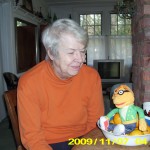
JH: Hey, Scooter. Would you like some pumpkin pie? You little cutie pie.
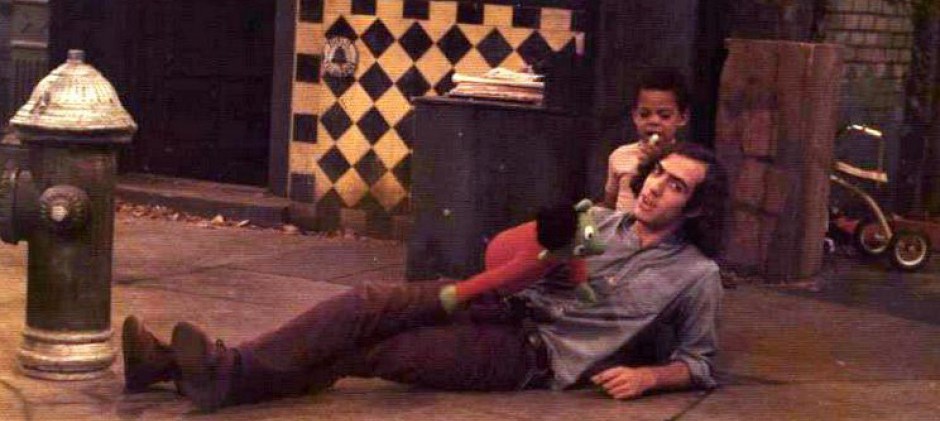
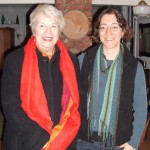
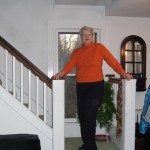
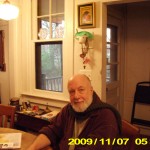
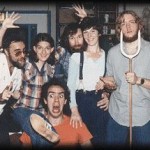
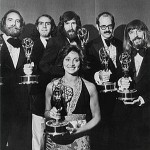
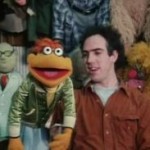

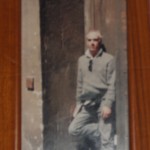
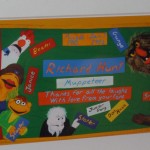
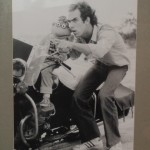
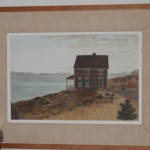
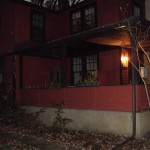
Pingback: Event: Muppeteer Richard Hunt Biography Reading « Voice Actors in the News
What a lovely interview. Thanks for sharing it.